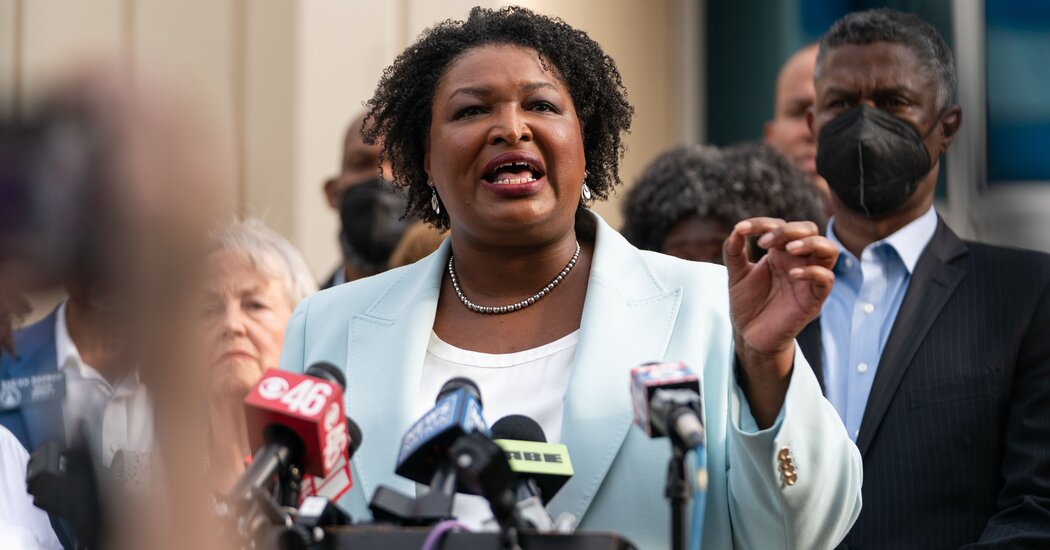ATLANTA — Stacey Abrams, the Democratic nominee for governor of Georgia, is racing to turn abortion rights supporters’ frustrations and fears into ele
ATLANTA — Stacey Abrams, the Democratic nominee for governor of Georgia, is racing to turn abortion rights supporters’ frustrations and fears into electoral gains for her party after a court ruling reinstated the state’s six-week ban on the procedure.
Immediately after the ruling from a federal appeals court, which put into effect a 2019 law prohibiting most abortions after six weeks of pregnancy, Ms. Abrams’s campaign released an advertisement on Thursday morning calling the law — and Gov. Brian Kemp’s support for it — “extreme” and hinting that the governor could move to ban exceptions for rape or incest.
And in an impassioned news conference late Wednesday afternoon, Ms. Abrams, flanked by more than two dozen state Democratic leaders, underlined the stakes for women in Georgia, with a specific message for those still unsure whether they would cast their vote for her in November.
“Georgia is part of a nation that faces economic vicissitudes — things go up, things go down,” she said. “But this law is permanent.”
She added that she would ask the state’s scores of moderate Republican and independent voters, who may be disillusioned with Democratic leadership in Washington, to “balance whether your immediate concerns about money outweigh your concerns about your constitutional protected rights.”
Read More on Abortion Issues in America
Ms. Abrams’s comments represented something of a bet: that for Democrats, it is better to focus on subjects on which the party’s positions poll better, like abortion, than on economic issues, on which voters tend to favor Republicans. Polls have consistently shown that inflation and other economic issues are voters’ top concerns ahead of the November midterm elections.
Ms. Abrams’s remarks also signaled a shift in her campaign message. While she has previously called for expanded abortion access in Georgia and criticized state Republicans, she is now making direct appeals to on-the-fence voters on the issue and portraying her opponent, Mr. Kemp, as the architect of one of the nation’s most restrictive abortion laws.
Ms. Abrams has sought to make abortion access one of the clearest dividing issues between her and Mr. Kemp. Days after a draft ruling revealing the Supreme Court’s intention to overturn Roe v. Wade leaked, her campaign redirected its fund-raising efforts to organizations that provide abortion care.
Several candidates on the state Democratic ticket have also pledged to use all levers of their power to oppose the law if elected, including the Democratic nominee for attorney general, Jen Jordan, who vowed not to prosecute abortion-related cases while in office.
Mr. Kemp, who has generally led Ms. Abrams in limited polling of the race, has not widely discussed abortion. In the weeks after the Supreme Court’s decision to strike down Roe v. Wade, his campaign focused instead on Ms. Abrams’s support for efforts to overhaul policing, aiming to tie her to the movement to defund the police, which she does not support.
When asked for comment on Ms. Abrams’s remarks on Wednesday, Mr. Kemp’s campaign pointed to an official statement from his office, in which he said the federal court ruling “affirms our promise to protect life at all stages.”
Ms. Abrams’s campaign views the next few weeks as pivotal in its effort to tell more voters about Georgia’s newly reinstated abortion law and its implications.
In a memo released Thursday, Lauren Groh-Wargo, Ms. Abrams’s campaign manager, shared internal polling showing that over half of voters in Georgia opposed additional abortion restrictions, along with more than 60 percent of independent voters.
“While Abrams will protect women and abortion rights as the next governor, Kemp will continue his crusade against women — including victims of rape and incest and those whose health is at risk,” Ms. Groh-Wargo wrote.
www.nytimes.com
